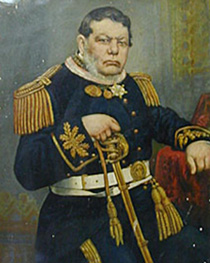David Canabarro
This article may require copy editing for grammar, style, cohesion, tone, or spelling. (August 2012) |
This article may be a rough translation from another language. It may have been generated, in whole or in part, by a computer or by a translator without dual proficiency. |

David Joseph Martins, known as David Canabarro (Taquari 1796 – Santana do Livramento 1867) was a military Brazil eiro.
Martins had Azorean ancestry: he was the grandson of Joseph Martin and Jacinta Faleiros Rosa Island's natural Third. Installed in Porto Alegre, their the man who would be Joseph Martins Coelho was born to them. Dona Mariana de Jesus Ignacia, born in Santa Catarina Island, who, with his parents and owner Manuel Ferreira Theodosius Perpetua de Jesus, would set in Bom Jesus de Triomphe by the year 1778. There she met her future husband, Jose Martins Coelho.
Following marriage they moved immediately to Taquari and had a son David Joseph on August 22, 1796. He was born in Pine, a league beyond the parish headquarters on land it had acquired Jose Martins Coelho, founding an office d ' and create.[clarification needed]
The surname "Canabarro" was added later, coming from his grandfather, Manuel Ferreira Theodosius, who had received the nickname Marquis Alegrete and added this title to his name.
Early military career
Campaigns against Artigas
David Joseph Martinez began his military career in the First campaign cisplatin in 1811–1812. His older brother, Silverio, then 18, should have been the one to take part in this war. However, he was needed at home to work. David, at the age of fifteen, acknowledging this and asked his father's permission to take his brother's place.
José Martins Coelho stood to the forces of the noble Don Diogo de Sousa, conde de Rio Pardo. After the campaign, promoted to Ensign, he returned home, though later he would fight in the War Artigas (1816/1820).
War of Cisplatin
Years later he was a lieutenant in the forces of Bento Gonçalves in the War of cisplatin in 1825–1828, which culminated in a peace treaty in August 1828 and the independence of Uruguay. There he played an important role in the Battle of Rincon de las Gallinas, saving the Brazilian army (September 24 in 1825). This earned him the the title of Army lieutenant. He took part in the 21st Light Cavalry Brigade commanded by Bento Gonçalves, the War of cisplatin, the undecided Battle of the Pass of Rosario, "obrando prodigies of valor and audacity".
When the war ended, he returned to life in the field, but this time associated with his uncle Antonio Ferreira Canabarro in the resort border of Santana of Deliverance. By 1836, he adopted the name David Canabarro at the insistence of his uncle. As suggested by the historian Ivo santanese Caggiano: "Everything suggests that he must have had some connection with the axes and ferreiras of Sabrosa. Consequently, the descendants of the noble Canavarros of Portugal must be the Canabarro Brazil."
War of Tatters
Canabarro was initially neutral in the Farringdon Revolution, or War of Tatters. He later joinded and started as a lieutenant, but quickly rose through the ranks, and took command in June 1843, when former boss, Bento Gonçalves (to avoid a split among Republicans) quit the command and went on to serve under the orders of Canabarro.
His only defeat in war was in the Battle of Porongos, which relaxed the peace negotiations he undertook with the Baron de Caxias. He had been surprised by the troops of Mouringue and had his troops defeated, including the Black Lancers.
While negotiating peace with the empire, Canabarro offered his services to Juan Manuel de Rosas, ruler of Argentina, who wanted to expand the borders of his country. In exchange for the cooperation of Ragamuffin, he would get help from Argentina to continue the battle against the empire. Canabarro responded by letter, where he stated his loyalty to the country.
As head of the rebels accepted the amnesty offered by the government in December 18 of 1844 by Duque de Caxias, called The Peacemaker. The negotiations on February 25 in 1845, it was agreed that Republicans would indicate the next president of the province, the imperial government account for the debt of republican government, rebel military officers who wished to pass imperial army in the same posts and the prisoners would be pardoned farroupilhas.
The Brazilian army
Still fought in the War against Rosas and War against Aguirre, receiving the title of general-honorary title with which he fought the invaders in the Paraguayan War.
Representations in culture
David Canabarro has been portrayed as a character in film and television, played by Milton Mattos in the movie Netto Loses His Soul (2001), Oscar Simch in the miniseries The House of Seven Women (2003),
- Porto Alegre, Achylles. Illustrious Men of Rio Grande do Sul Livraria Selbach, Porto Alegre, 1917.
- Caggiano, Ivo Caggiani. David Canabarro lieutenant of the general. Porto cheerful: Martin Book, 1992.
